Looking for a job in podcasting? As the podcast industry grows, new opportunities are popping up everywhere. There’s no better time than now to make podcasting your career. In this article, we discuss podcast jobs and job boards, and offer some key advice to find your next job.
Where to Find Podcasting Jobs
As the industry grows, there are more podcast jobs than ever before. Here are some popular platforms and services you can use to find your next job in podcasting.
1. Podjobs
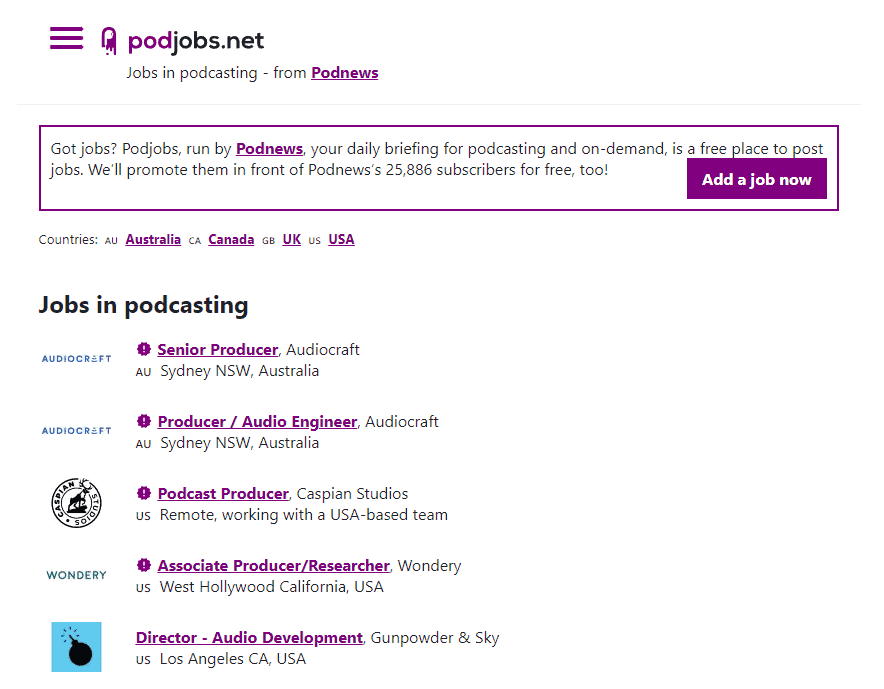
Podjobs is a simple job board for anyone looking for work in the podcasting industry. Podcast owners and recruiters simply create a listing that explains the job and its requirements. Applicants can press the “Get more details” button to learn more. Podjobs just connects the two parties. It doesn’t play any role in the conversation.
Adding a job to Podjobs is free. Recruiters have a lot of flexibility. They can point applicants to their favorite job service (like Careerbuilder or Indeed) or their own website.
Podjobs does not accept unpaid jobs of any kind. So if you’re looking to find or advertise a job that doesn’t compensate applicants, you’ll need to use a different service.
2. Podnews
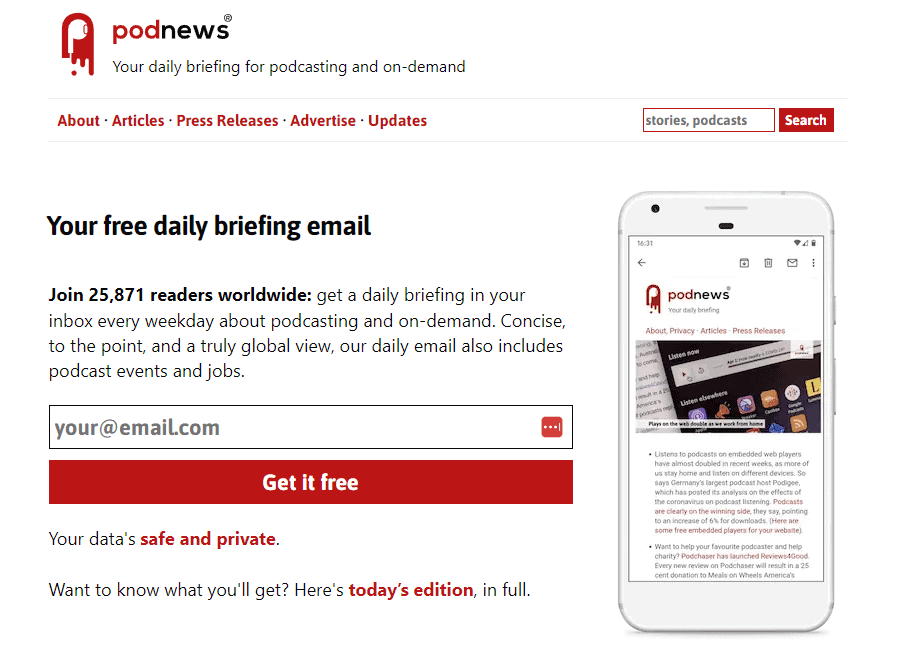
Podnews is one of the most popular podcasting newsletters in the world. You can sign up to get a daily briefing in your inbox every weekday about podcasting. Each email is brief, concise, and global in scope. It also includes events and jobs. Check out the latest edition.
Podnews is also the owner of Podjobs, so the jobs are all the same. The benefit of following Podnews is that the jobs appear in your inbox every week, rather than having to check the job board. But use whichever site works best for you.
3. AIR
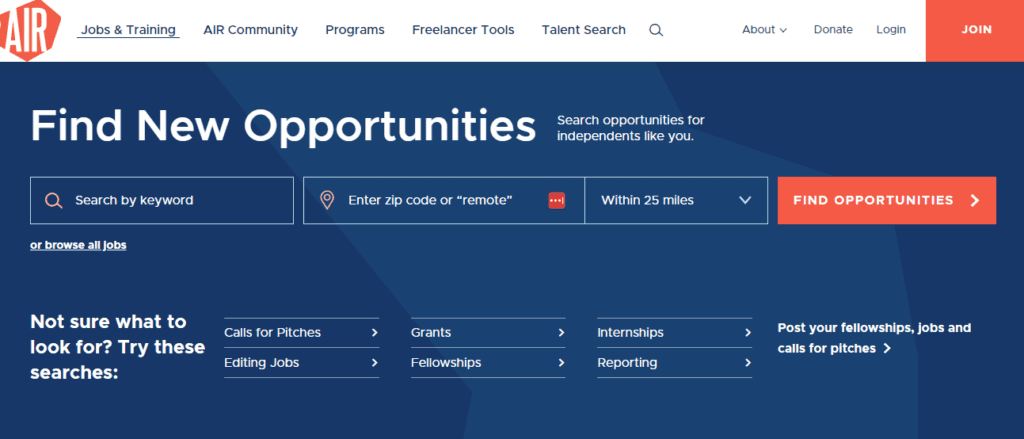
AIR is a global community of independent audio producers. There are more than 1,500 journalists, podcasters, story editors, audio producers, documentarians, engineers, sound designers and media entrepreneurs who are part of AIR’s community. Their members are all over the world. Members get all kinds of training, tools, peer support, and mentorship.
AIR usually has 150-250 job opportunities at any given time. They are located all over the world. About half of them are usually remote, so don’t be afraid to browse even if you don’t live in a major city.
AIR has full time, part time, fellowship, and contract opportunities. You can refine your search by location and type of work (writing, editing, producing, engineering, voice, etc.).
The one downside is that you have to join AIR in order to apply. It costs $100 for a yearly membership. That said, these are high quality opportunities. Some opportunities are with major companies that produce dozens of podcasts. So the $100 may be worth it for you.
Even if you don’t use AIR to find a job, you can use it to connect with other podcasting and audio professionals through their talent directory. It’s all about who you know
4. LinkedIn Podcast Jobs
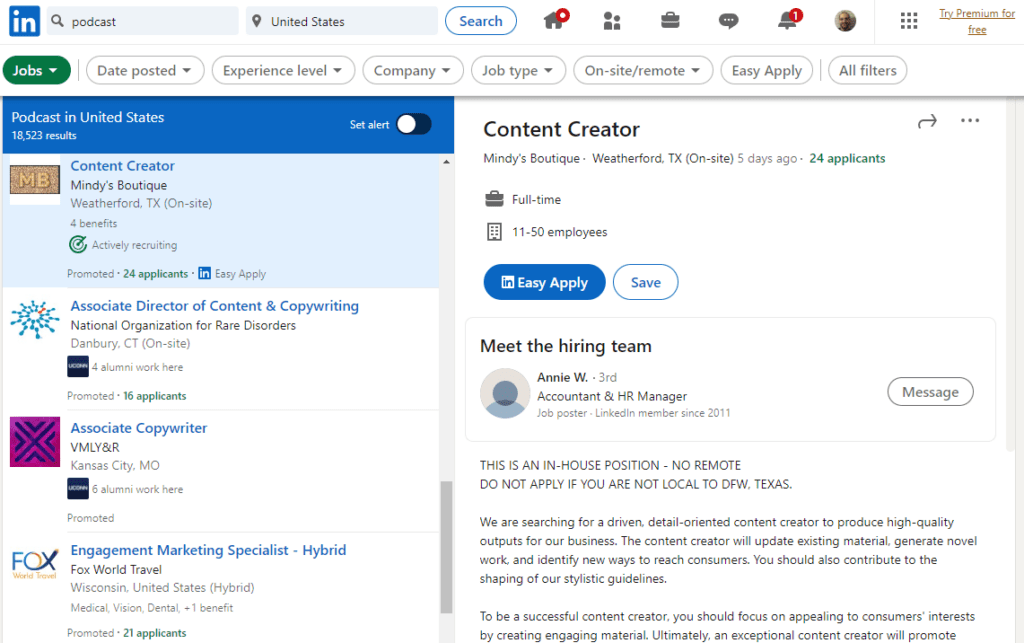
LinkedIn is a popular platform to find jobs. They have listings for nearly everything, but their podcast section is particularly popular. You probably already have a LinkedIn account, so browsing and applying for jobs is easy. Plus you can use your network to secure introductions and recommendations.
While there are lots of opportunities on LinkedIn, many of the jobs listed here are multifaceted. You may end up in a role overseeing the podcast, blog, newsletter, and other other content deliverables.
5. General Job Boards
As podcasting grows, countless companies are introducing podcasts to communicate with their audience, customers, and team. Many are even developing private podcasts to communicate with select groups of people. This means that podcast jobs aren’t niche anymore. They are popping up on the mainstream job boards.
Upwork is another popular platform to find podcasting work. Most of these opportunities are contract-based (meaning they end when a milestone is met or a deliverable is completed). But this is a great way to earn some money and build your podcasting skills. If you don’t have a lot of experience in the podcasting world, you can gain that here. Plus, many companies hire freelancers for one-off projects and then hire them full-time if things work out.
6. Your Own Podcast
If you can’t find a job in podcasting that suits your needs, consider starting your own podcast. No, this doesn’t come with a paycheck right away. But it gives you the opportunity to create the content you care about the most and build an audience that loves what you have to say. With the right marketing techniques and monetization strategies, you could potentially create something far more valuable than a job.
Worried about doing it alone? Consider working together with a few friends or create a podcast team. This allows you to create a simple podcast workflow by distributing the work among several people. Countless podcasts are hosted or produced by two or three people and many have entire teams behind the scenes.
If you think you can make it as a podcaster, check out our complete guide on starting a podcast. It tells you everything you need to know to plan and launch your show.
The Benefits of Podcast Jobs
Why would you want to work in podcasting? There are several benefits:
- Flexibility: Podcasting allows for a flexible schedule and the ability to work from anywhere with an internet connection. You’ll also most likely work remotely.
- Creativity: Podcasting offers the opportunity to express creativity and share unique perspectives and ideas with a large audience.
- Career growth: The podcasting industry is growing rapidly, providing opportunities for career advancement and growth.
- Independence: Podcasting allows for complete control over the content and direction of a show, providing a level of independence and autonomy in one’s work.
- Passive income: A successful podcast can generate passive income through advertising, sponsorships, and other monetization strategies.
- Networking: Podcasting provides opportunities to network and collaborate with other industry professionals and potential guests.
- Personal fulfillment: Podcasting can be a fulfilling and rewarding way to share knowledge, experiences, and passions with others.
What Kinds of Podcast Jobs Are Available?
Successfully producing a podcast requires a range of skills. New podcasts are typically managed by one person who wears every hat. but as podcasts grow, they tend to hire a team of highly skilled, specialized people.
Here are some of the common jobs related to podcasting. Note that many of them go by different names, but the responsibilities are similar.
- Producer/manager
- Guest coordinator/scheduler/outreach manager
- Host (some shows have two or more hosts)
- Writer/copywriter/content writer/scriptwriter
- Marketing associate/public relations
- Audio editor/engineer
- Designer/visual editor
How Much Does a Podcast Producer Get Paid?
According to ZipRecruiter, the national average for a Podcast Producer is $23 an hour, which comes out to about $47,000 a year. Some podcasts pay per episode. According to Podcast Productions School, that can range between $150 and $250 per session. Podcast producers with deep skills and experience running and growing popular shows can command a lot more.
Can Podcasting Be a Career?
Yes, absolutely. In fact, this is more true now than ever before. You can make podcasting your career by either starting your own show (which gives you total control over the trajectory of your career) or get yourself hired by an existing production (in which case you’ll probably fulfill a specialized role).
If you decide to make podcasting your career, don’t limit yourself to one discipline or area of expertise. Immerse yourself in the entire genre, learn as much as you can, and acquire as many skills as possible. The more you know, the more valuable you are to employers and shows.
How to Get a Podcast Job
If you haven’t already, your first step is to pick up some skills that would help you in your preferred podcast role. If you want to be an audio engineer, you need lots of experience editing sound and using common editing software.
Consume lots of podcast content, including shows that don’t necessarily align with your interests. Your goal is to expose yourself to lots of formats, ideas, styles, and hosts. Stay abreast of industry news and trends, as well. Subscribe to the best industry sources, such as Podcasters Roundtable, Podcast Perspective, Hot Pod News, Podcast Business Journal, and The Feed.
Next, follow the job sources we outlined above. You may not find the perfect opportunity right away, but eventually something will appear that fits your needs. Apply immediately with as much enthusiasm as possible. Many podcast jobs are remote, so be prepared to work from home with whatever tools are necessary for your role.
We also strongly consider starting your own podcast. It doesn’t have to be elaborate and you don’t have to invest a lot of money to grow an audience. Just create something that serves as a portfolio to showcase your capabilities, skills, and ability to follow through. Employers are much more likely to hire you for their podcast if you have experience producing your own.
Now’s the Time to Work in Podcasting
In conclusion, podcasting is a dynamic and rapidly growing industry that offers a wide range of benefits for professionals. As the popularity of podcasts continues to increase, the demand for skilled professionals in the field is only set to rise. Whether it be in audio engineering, production, marketing or content creation, there are ample opportunities for those looking to make a career in podcasting. With the right skills and determination, a career in podcasting can lead to a fulfilling and rewarding work experience.
Do you have a job in podcasting? Let us know in the comments where you found your position.

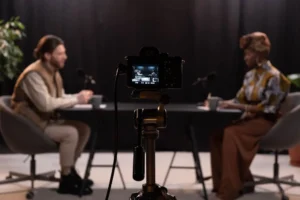


Great article, Dennis! Do you know if most of the job boards and PodNews are based in the States? I live in Canada, so I’m wondering if most of the job opportunities will only be available to residents of the U.S.